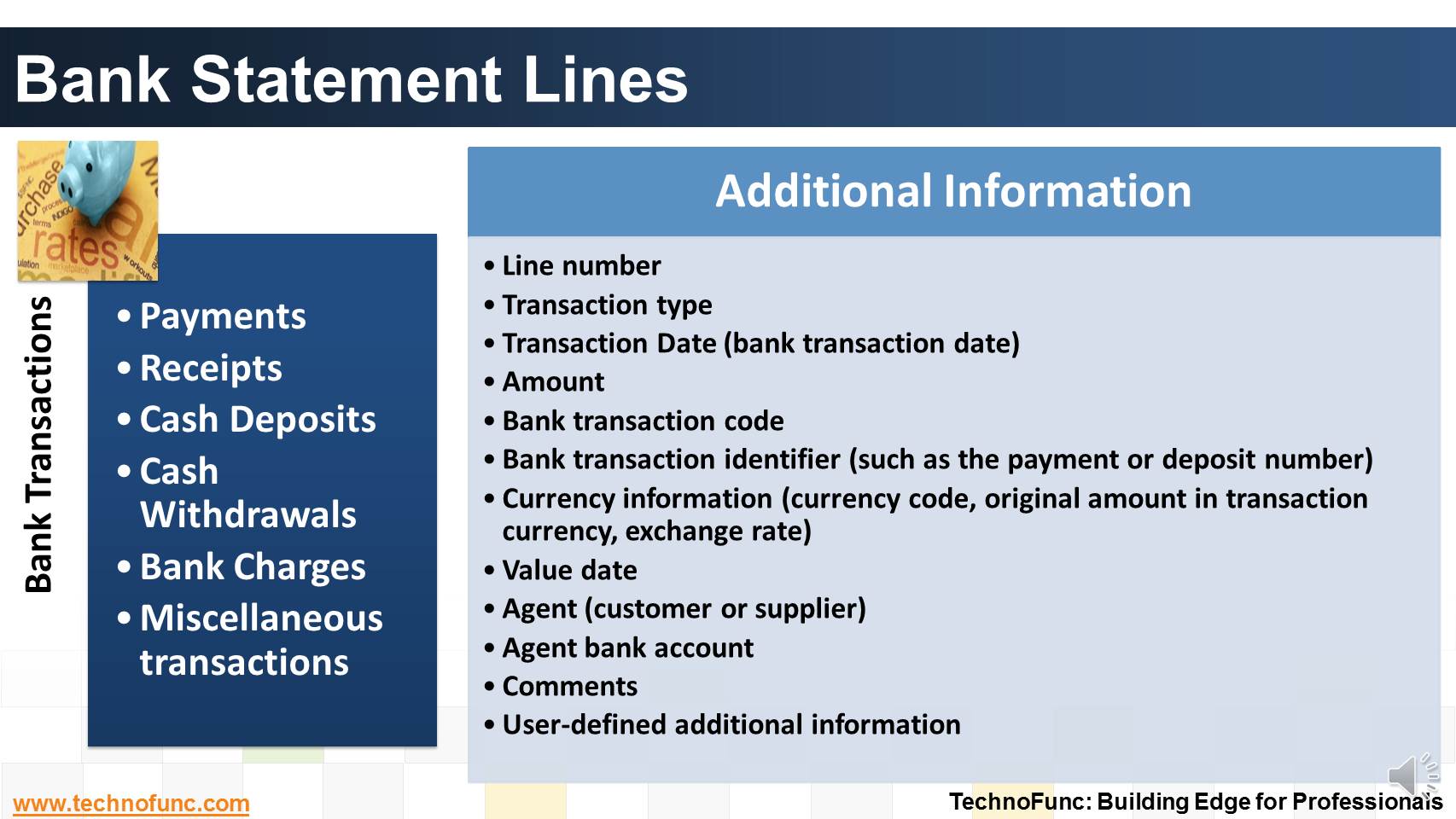- Home
- Business Processes
- Industry Knowledge
- Aerospace Industry
- Automotive Industry
- Banking Domain
- BFSI Industry
- Consumer/ FMCG Industry
- Chemicals Industry
- Engineering & Construction
- Energy Industry
- Education Domain
- Finance Domain
- Hospitality Domain
- Healthcare Industry
- Insurance Domain
- Retail Industry
- Travel and Tourism Domain
- Telecom Industry
- Leadership Skills
- eLearning
- Home
- Functional
- Cash Management
- Bank Statement Lines
Bank Statement Lines
So many codes in the lines that are there in a Bank Statement. It contain lots and lots of meaningful information that can help automated many tasks. Explore more!
Bank Statement Lines
Given below are the types of transactions that generally constitute a bank statement-
- Payments
- Receipts
- Cashflows
- Miscellaneous transactions
- Each transaction is further supported with additional information.
The typically available information is could be of the nature shown here.
This additional information is very critical for automated reconciliations as you will notice in the upcoming articles.
Additional Information
- Line number
- Transaction type
- Transaction Date (bank transaction date)
- Amount
- Bank transaction code
- Bank transaction identifier (such as the payment or deposit number)
- Currency information (currency code, original amount in transaction currency, exchange rate)
- Value date
- Agent (customer or supplier)
- Agent bank account
- Comments
- User-defined additional information

Related Links
You May Also Like
-
The terms Treasury Management and Cash Management are sometimes used interchangeably, while, in fact, the scope of treasury management is larger and includes funding and investment activities as well. Learn all about Treasury Management here!
-
Bank reconciliation process is targeted to validate the bank balance in the general ledger and explain the difference between the bank balance shown in an organization's bank statement. Learn the reasons for existence of differences between the two.
-
Bank Reconciliation is a PROCESS to Validate the bank balance in the general ledger With Bank Statement. Learn the bank recon process.
-
In automated clearing, Bank statement details are automatically matched and reconciled with system transactions. Learn how this process works and what are the perquisites to enable the same.
-
Account Reconciliation – How? Learn the three key attributes to perfom account reconciliation.
-
So many codes in the lines that are there in a Bank Statement. It contain lots and lots of meaningful information that can help automated many tasks. Explore more!
-
What is Account Reconciliation?
Before you understand the Bank Reconciliation Process it is important to understand what is account reconciliation and why it is carried out.
-
Although there is no straight forward answer to the question, how to best organize a treasury function, this article provides an generic view of the way large MNCs creates departments or sub-functions within the treasury function.
-
Treasury has increasingly become a strategic business partner across all areas of the business, adding value to the operating divisions of the company. Managing activities that were traditionally carried out within the general finance function. Learn about the drivers for this change.
-
Many different accounts are used in finance. Understand the representation and nature of clearing account in context of accounting, finance and ERP Systems.
Explore Our Free Training Articles or
Sign Up to Start With Our eLearning Courses

About Us
Learning
© 2023 TechnoFunc, All Rights Reserved










